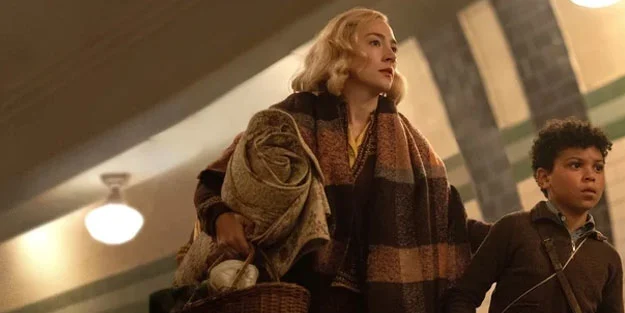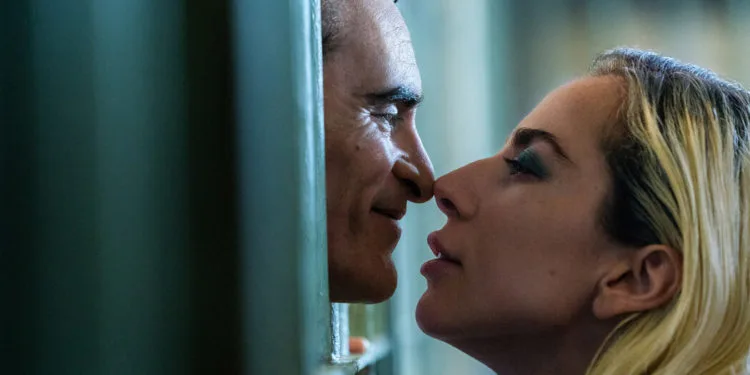There’s a moment early on in Steve McQueen’s Blitz in which Rita (Saoirse Ronan), a munitions-factory worker with a flair for singing, unwillingly takes off her young, mixed-race son George (Elliott Heffernan) to the countryside to flee the horrors of incessant bombardment. It’s a situation we have seen a million times before — a sad train-station goodbye — but McQueen renders it heart-rending. Over its two-hour running length, Blitz pulls off this trick regularly. Seen via McQueen’s vivid yet clear-eyed lens, it takes standard scenarios from innumerable old black-and-white pictures and makes them appear raw, genuine and contemporary.
The narrative opens with the intensity of D-Day: Saving Private Ryan transferred to Stepney Green. In the aftermath of a night-time Luftwaffe bombing sortie, firemen are attempting to suppress a roaring flame (imagine facing Drogon with a few of pails of water). At one point, a canvas hose escapes from a fireman’s grip, knocks him unconscious and starts writhing about like a terrible snake. It’s at once violent and beautiful, an intoxicating depiction of World War II on the homefront.
Out of the devastation, a simple plot unfolds, moving between the perspectives of George and Rita. From the minute George decides to alight that speeding train, Blitz flirts with becoming a myth. There’s train-top hijinks, a run-in with a gang of boldly painted Dickensian looters (Stephen Graham and Kathy Burke), and a flooded Underground stop. This sequence of experiences sometimes feel a touch bloated as the picaresque voyage goes on, but it’s almost always fascinating.

Most movingly, George is on a trip of self-discovery concerning his lineage. He meets Ife (Benjamin Clementine, charming and friendly), a Nigerian air-raid warden who finds him in a luxury mall staring at dioramas of colonial horrors demonising Africans as savages. George has repeatedly suffered racist remarks, but under Ife’s kind teaching he movingly learns to find pride in his background.
Rita, meantime, is attempting to find meaning without her son and helps at a communal shelter for the displaced. Without ever being clichéd, McQueen portrays the Blitz spirit, how war produces a sense of camaraderie and belonging. Proving we are perhaps not as forward-thinking as we think we are, Blitz not only depicts ’40s London as a vibrant cultural melting pot but also reveals women as trailblazers, be it in activism, protesting the lack of safe shelters, or paving the way for the sexual liberation we traditionally associate with the ’60s.
While his picture echoes the greats of British cinema — the fire-fighting faces of documentarian Humphrey Jennings, the decency of Powell & Pressburger, the pub sing-a-longs of Terence Davies — McQueen creates a language of his own. He converts the waters of the Thames as seen from German bombers into nearly alive abstraction. Grainy imagery of flowers punctuates the action, soft and elegiac. Perhaps most remarkable is a montage of bomb-making, Hans Zimmer’s music blending with the mechanical rhythms of the equipment – the irony of Rita cooperating on tools of death is not missed on the director.
Read Also: Movies to Watch on Disney+

As with McQueen’s past works, music plays a key element throughout. It produces touching moments of familial closeness, like when Rita, George and his grandpa (an effective Paul Weller, who, at one point, is actually going underground) sing ‘Ain’t Misbehavin’’ around the old Joanna. It is a source of national consolation when Rita performs in a BBC broadcast from her workplace. And it gives an avenue for joy in the harshest conditions. When the film rushes back to Rita meeting George’s father Marcus (CJ Beckford), McQueen creates a sizzling club scene, a wonderful inter-racial dance routine full of sexuality and fire. Later, he throws us abruptly into a kick-ass big-band piece in the Café de Paris, an underground location secure from falling bombs. The discovery as to why we are there is shattering.
Blitz finds Saoirse Ronan at the top of her game, bringing heart and grit in a pitch-perfect East End accent. But the picture primarily rests on the shoulders of young Elliott Heffernan, who balances vim and verve with periods of quiet, expressing tons by doing very little. Rita is crushed when she is forced to send her kid away and, by the last reel, Ronan, Heffernan and McQueen will break you too.







.webp)



